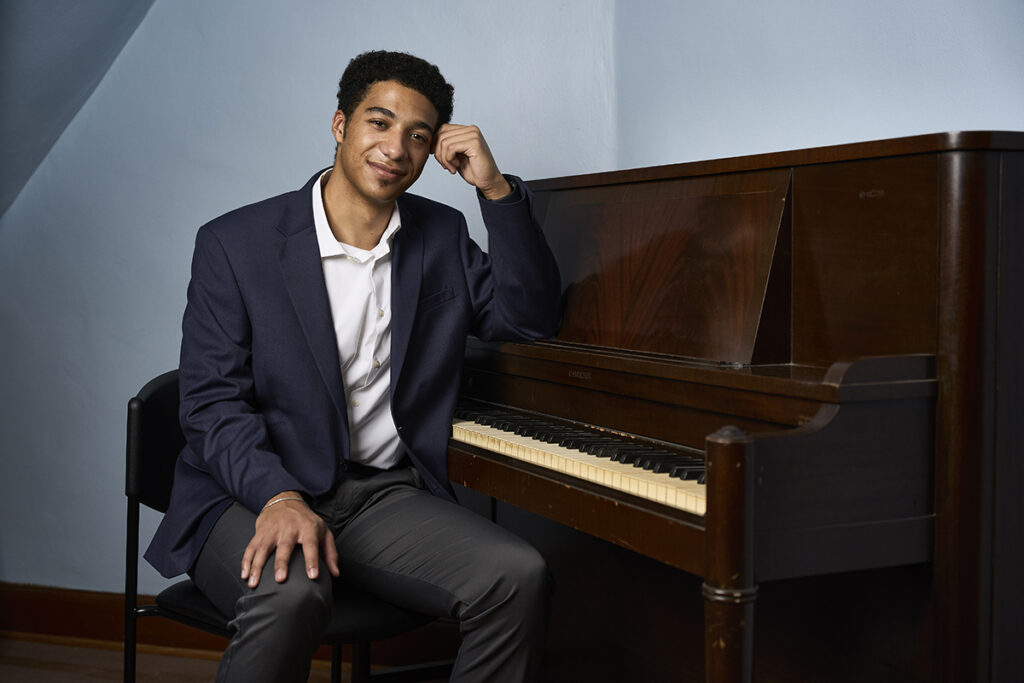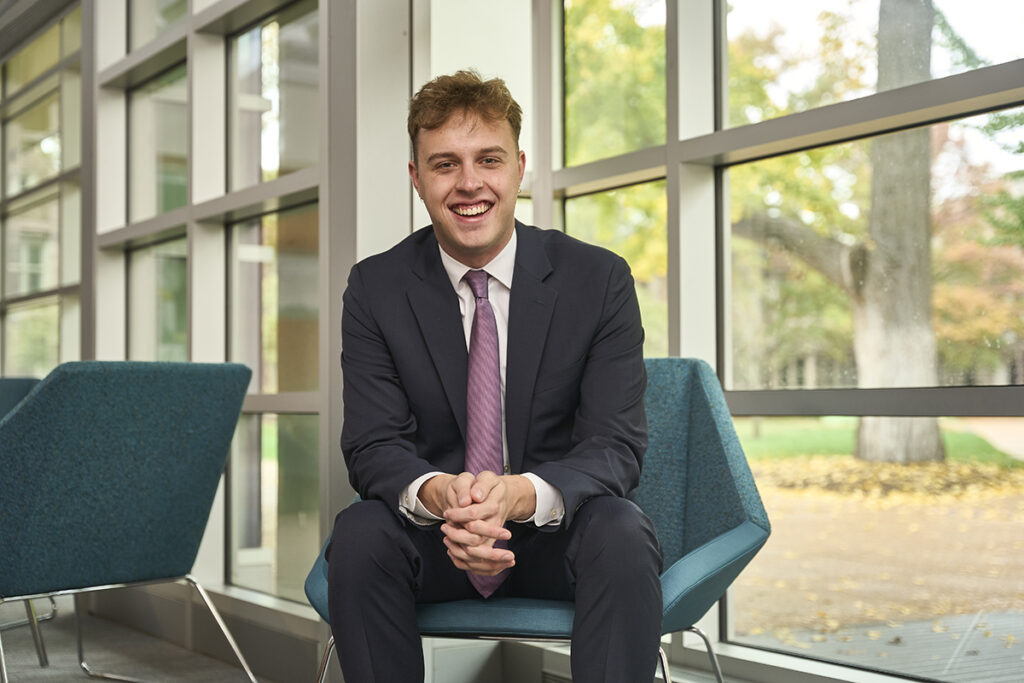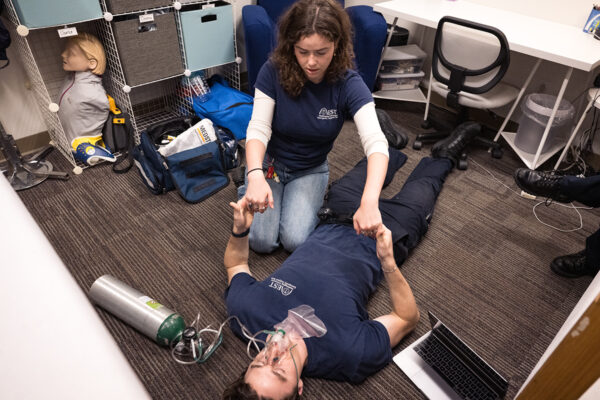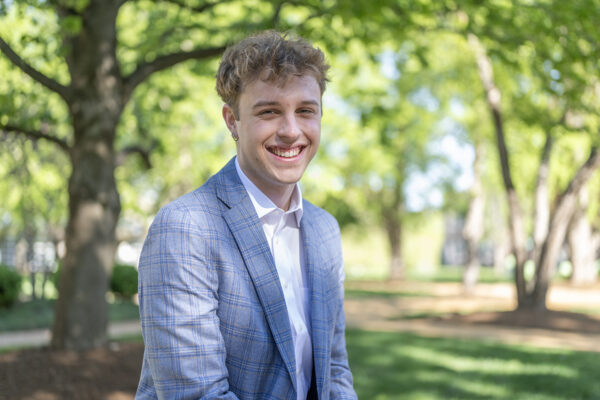Washington University in St. Louis seniors Elijah Darden and Isaac Seiler were both Rhodes Scholars finalists, one of the world’s highest academic honors.
Darden, 22, is majoring in psychological and brain sciences and minoring in music, both in Arts & Sciences. He is a member of the Rodriguez Scholars program and president of WashU’s Emergency Support Team (EST), the student-run emergency medicine organization. Darden aspires to be a physician and develop effective community education programs that reduce health disparities in various populations.
Seiler, 22, is majoring in sociology and minoring in political science, both in Arts & Sciences, and won the Truman Scholarship earlier this year. Seiler hopes to one day run for public office and enact policies that protect and propagate local news outlets.
Chancellor Andrew D. Martin said Darden and Seiler already have made substantial contributions to their respective fields.
“Elijah and Isaac are both impressive leaders, scholars and changemakers,” Martin said. “I am confident each will make a big impact addressing the critical problems that they have identified.”
Washington University has had 30 Rhodes Scholars, including Victoria (Tori) Harwell, AB ’24, who won the scholarship last year.

Better health outcomes through better education
Darden understood from a young age that good health depends on good access — good access to sound information, knowledgeable providers and affordable care. Darden’s father and his 15 siblings grew up poor on Chicago’s south side with no access to those vital resources. Darden’s mother, in contrast, lived on a farm in rural Wisconsin. But no one there — neither the local residents nor the local doctors — understood the health risks associated with toxic pesticides her family was exposed to day after day.
“My family is from two very different types of communities, and yet they both were disadvantaged in ways that had long-term consequences to their health,” said Darden, of Naperville, Ill., a Chicago suburb. “Their experiences instilled in me a drive to pursue health equity for populations who are at risk due to their socioeconomic status, race, gender or where they are from. I want to empower individuals and their communities through health literacy. Different communities, whether it’s a rural community or an urban community, need different policies and interventions.”
During his tenure with EST, Darden has made training programs more accessible and affordable to WashU students, staff and faculty members. American Heart Association Basic Life Support/CPR training now costs $10, considerably less than the $80 many private companies charge. In addition, Darden helped secure Student Union funding to cover training fees for undergraduate students. The result: EST has certified roughly 800 WashU community members in CPR.
Darden also introduced “Stop the Bleed” classes and active bystander training for the broader WashU community. Darden’s efforts have been recognized by the National Collegiate Emergency Medical Services Foundation, which named WashU a HeartSafe Campus for the first time in university history, and the Missouri Public Health Association, which awarded EST the Group Merit Award for its significant contribution to public health in Missouri.
Darden also is committed to educating the educators. In collaboration with the LifeSaveHer Program established at Harvard and the Massachusetts Institute of Technology, Darden is studying comfort levels among trainees who learn CPR on realistic female mannequins. The findings matter because women have lower cardiac arrest survival rates than men. The reasons why are many — bystanders don’t recognize the signs of cardiac arrest in women; they fear compressions will cause injury and they are unfamiliar with Good Samaritan laws. But another key factor is that most CPR classes use only male mannequins. EST, in contrast, uses mannequins that simulate the anatomy of a female chest.
“We knew we could help them because we have a robust CPR program here and psychological expertise to evaluate the difference in reaction times,” Darden said. “To me, health equity also is about improving the pedagogy for providers, too.”
Cheri LeBlanc, MD, executive director of the Student Health Center – Danforth Campus and EST faculty adviser, said Darden’s research and advocacy have the potential to make a significant impact on CPR education.
“Elijah is a rare individual whose visionary drive and selfless dedication leave lasting impacts on his communities,” LeBlanc wrote in her recommendation to the Rhodes selection committee. “He maximizes opportunities to their fullest potential and consistently applies his leadership skills to achieve meaningful change.”

Promoting democracy by protecting public interest journalism
Seiler has served as a journalist, been covered by journalists, and, as the youngest communications director in congressional history, worked daily with journalists. So Seiler knows the value of local journalism. To strengthen what he calls a public good, Seiler wants to develop programs and regulations that strengthen local newsrooms.
“Without strong public interest journalism, falsehoods will become mainstream, government will become unaccountable and democracy will fail,” said Seiler, of Grand Rapids, Mich. “Today, the free market is not supporting local journalism. But what if we stopped treating local news as a product, but rather as a public good? What tools, such as grant programs, public-private partnerships and regulatory fixes, could we use to subsidize this essential work?”
Seiler first developed an interest in journalism as a student reporter at his private Christian university. Then, during his sophomore year, Seiler organized protests in support of a professor who lost his job after officiating at a same-sex wedding.
“Student, local and national journalists all documented the protests,” Seiler said. “Community members would not have been aware of our advocacy work if not for the work that those journalists did. That was the pivotal moment I realized how critically important journalism can be, even in my own life.”
Seiler dropped out of college and got involved in local politics, ultimately serving his home district as communications director in Washington, D.C. Many in that role try to spin or dodge journalists. But Seiler appreciated their tough questions. He also empathized with their working conditions.
“It takes resources to produce good public interest journalism, and many of the amazing journalists and producers I worked with on a daily basis didn’t have what they needed,” Seiler said. “One of my personal beliefs is that information has the power to unite and power to divide. Information makes us who we are as people. So who produces that information we consume matters. Right now, we have this really complicated, fragmented media environment where local journalists cannot compete. Their home communities pay the price.”
Seiler arrived at Washington University as a transfer student in 2023 and won the Truman Scholarship, the leading public service graduate fellowship, in 2024. For his honors thesis, he is investigating the decline in local news in other liberal democracies and has traveled to Australia to identify common causes and potential solutions to news deserts.
Caitlyn Collins, an associate professor of sociology in Arts & Sciences and Seiler’s thesis adviser, said Seiler is poised to make important contributions to both the study and practice of journalism. For her class, “Social Inequality in America,” Seiler delivered a guest lecture that drew a straight line from the Federal Communications Commission’s abolishment of the fairness doctrine in 1987 to today’s hyper-partisan news entertainment outlets to the crisis of political polarization and institutional distrust.
“At the heart of his project is a desire to uplift local journalists: people who expose corruption, advocate for civil rights and keep the public informed every single day,” Collins wrote in her recommendation. “Isaac has excellent training, a keen, critical eye and a dogged work ethic. His life’s work, as Isaac puts it, is public service and protecting people’s civil liberties. To this end, he has his eye on public office — an aspiration I am confident he will achieve in the years ahead. Isaac’s maturity, convictions, unimpeachable character and leadership trajectory are plain to see.”


